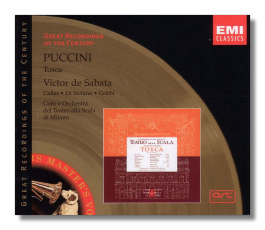
The Internet's Premier Classical Music Source
Related Links
- Puccini Reviews
- Latest Reviews
- More Reviews
-
By Composer
-
Collections
DVD & Blu-ray
Books
Concert Reviews
Articles/Interviews
Software
Audio
Search Amazon
Recommended Links
Site News
 CD Review
CD Review
The Greatest Tosca Of All Time

Giacomo Puccini
Tosca
- Maria Callas (Tosca)
- Giuseppe di Stefano (Cavaradossi)
- Tito Gobbi (Scarpia)
- Franco Calabrese (Angelotti)
- Melchiorre Luise (Sagrestano)
- Angelo Mercuriali (Spoletta)
- Dario Caselli (Sciarrone/Un carciere)
- Alvaro Cardova (Un pastore)
Orchestra & Chorus of La Scala, Milan/Victor de Sabata
EMI Classics 67756 2 ADD (monaural) 2CDs: 43:12, 66:22
For the occasion of Maria Callas's 25th anniversary, Gerald Fenech reviews EMI's special limited edition version of de Sabata's legendary 1952 recording of Puccini's 'Tosca' featuring the great triumvirate of Callas, Gobbi and Di Stefano.
This has long been seen as 'hors concurs' in the great annals of Tosca's recorded history. Although some have found faults with de Sabata's uncommonly fast speeds throughout the work, there is no denying the splendid white heat that permeates this unforgettable performance.
Maria Callas is simply unsurpassable. Here she was in the absolute prime of her voice and her rendering of that famous Second Act is quite simply spine-tingling in all departments. Avid opera lovers would have seen the justly famous 1962 Covent Garden performance in which any serious enthusiast must be moved to tears, and this recorded performance is an audio replica of that visual one. The unflagging perfection in diction and crisp, sharp phrasing are also matched by Gobbi's unique Scarpia who is the very embodiment of evil.
Di Stefano is also a brilliant Cavaradossi who manages to convey just the right amount of angst and passion although I continue to say that Mario del Monaco is the best (by a short measure) in this other demanding role. The conductor is no less impassioned in his direction, here was a fiery and inspired de Sabata who galvanised his La Scala forces into playing of almost unimaginable perfection.
One could go on claiming superlatives and in this limited edition, EMI has surely produced a set that should be the 'Tosca' of all 'Toscas'! The pressure points of the work such as 'Recondita armonia', the 'Te Deum', 'Vissi d'arte' and 'E lucevan le stelle' are all classics, having been heard for countless times in various compilations and other highlights releases but the whole symphonic sweep of the complete recording leaves one completely drained at the end. The engineering has refined the somewhat brusque sound somewhat and Richard Osborne's essay is highly intriguing as it offers some unshed light on the recording's pains and labours.
But our enduring memory remains with Maria Callas placing those candlesticks beside the dead body of Baron Scarpia and uttering, like in a passage frozen in time;
'E avanti a lui, tremava tutta Roma'
Copyright © 2002, Gerald Fenech


















